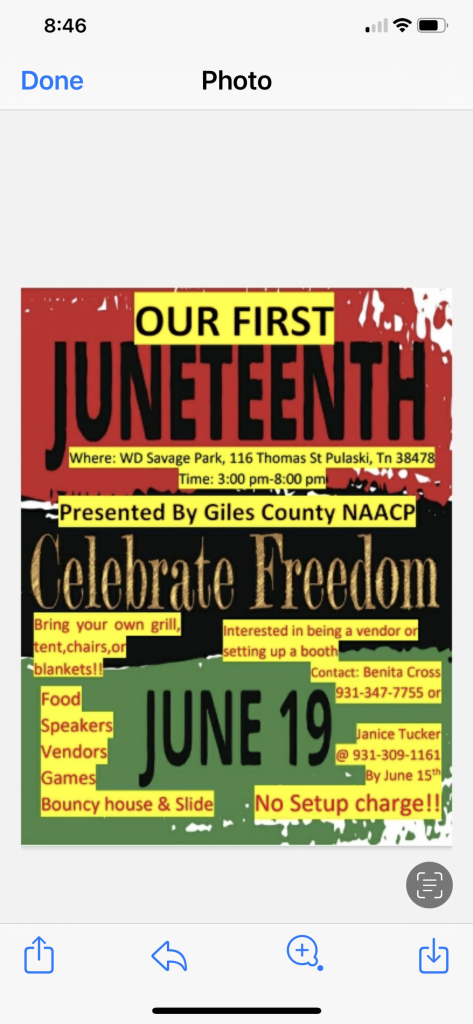By Clint Confehr
PULASKI, TN — “The connection … between employer and hired
labor” as mentioned in the Emancipation Proclamation deserves close
examination, according to a Juneteenth speaker here.
Richard Kemp of Pulaski deals with tax issues for clients at his own
office. He says financial literacy is “the key to financial freedom.”
Investments and controllable assets can supplant a system of hired labor
and support a life of greater freedom.
Kemp and other speakers, including Pulaski native Van Johnson now of
Murfreesboro who hosts The Scenario Radio Show, celebrated
Juneteenth as when, in Galveston, Texas, Union troops enforced
emancipation. Juneteenth was: nearly 30 months after Lincoln’s
proclamation; 10 weeks after the Confederacy surrendered; and, five
weeks after the war’s last battle 62 miles northwest of Galveston.
“Nobody is free until all of us are free,” said Van Johnson who appears
as Van Everette to avoid confusion with another commentator. He’s on:
107.1 and 103.7 FM Nashville on Saturdays; other stations elsewhere;
and podcasts.
Juneteenth, according to Janice Tucker who helped organize celebration
here, is “to share with and educate the community — not only African-
Americans — about the importance of the day.”
Pulaski native Keidron Turner, a rising Belmont University senior, spoke
at W.D. Savage Park where the NAACP held the event. “It took brave
people like Rosa Parks and Martin Luther King to remind us that we’ve been free only so long,” Turner said. Blacks should: “act like we’ve been
free for that long; exercise those freedoms; organize; run for office; and
get out to vote.”
Kemp said, “I want to focus on something that’s tangible… You want to
be free in your mind.” He discounts a “mindset that you have to be
subject to somebody else’s vision.” He quotes Robert Kiyosaki, an
author who founded Rich Global and Rich Dad Company: “How much
did your job pay you to give up on your dream?”
Lincoln’s proclamation freed people to be soldiers through “an absolute
equality of personal rights … [T]he connection heretofore existing
between … [slavers and enslaved] becomes that between employer and
hired labor.” Freedmen were advised to remain at home “and work for
wages.”
“To me,” Kemp said, “that was the birth of the new slave.”
Work agreements have employees devote time and labor — which might
be dedicated to their dreams — in exchange for wages and benefits to
support their employer’s business; someone else’s dream.
“There’s more of a move for financial freedom in America now,” Kemp
said. “It’s no longer about Black and white, or about slavery. The
conversation needs to be about financial freedom … to be free to enjoy
your life and be with your family.”
Juneteenth was Father’s Day when unionization of a Baltimore-area
Apple store was reported by The New York Times; more than 24 “Apple
stores … expressed interest in unionizing …”
Kemp advocates self employment. Johnson said “There are people who
cannot afford to be independent contractors.”
Without social media, Tucker said, soldiers told enslaved people what
the “slave master didn’t want them to know.”
Pulaski’s website says the city wants a “proactive community that draws
… strength from … heritage and … diversity of … citizens while
respecting the dignity of the individual … encouraging citizen
participation, responding to … collective needs of the community, and
serving the public trust with fairness and integrity.”
“That,” Tucker said, “is a great goal. It’s a long path. We’re headed in
the right direction. True change comes when we are all recognized, and
hearts have truly changed.”
Pulaski native Lena Will Brown Prince, Antioch, was the first Black
graduate of Martin Methodist College (now UT Southern) in Pulaski
where the Klan started. Does she feel prejudice there? “I don’t notice it,
but I’m not there that much.”


